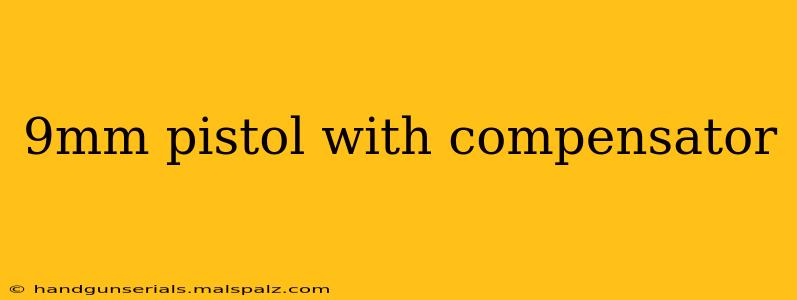The 9mm pistol has long been a favorite among both law enforcement and civilian shooters, prized for its manageable recoil, ample ammunition capacity, and relatively low cost. However, for those seeking to push the boundaries of accuracy and control, adding a compensator can significantly enhance the shooting experience. This comprehensive guide explores the world of 9mm pistols equipped with compensators, delving into their benefits, drawbacks, and considerations for choosing the right setup.
Understanding the Role of a Compensator
A compensator is a muzzle device attached to the barrel of a firearm, designed to reduce recoil and muzzle rise. Unlike a suppressor (which reduces sound), a compensator redirects propellant gases to counteract the upward and rearward forces generated during firing. This leads to several key advantages:
Benefits of a Compensator on a 9mm Pistol:
- Reduced Recoil: By mitigating the upward force, the compensator allows for faster target reacquisition and improved follow-up shots. This is particularly beneficial in rapid-fire situations.
- Decreased Muzzle Rise: The reduction in muzzle rise keeps the sights on target longer, promoting greater accuracy, especially during multiple shots.
- Improved Accuracy: The combined effects of reduced recoil and muzzle rise translate to improved overall accuracy and grouping. This is crucial for both competitive shooting and self-defense scenarios.
- Enhanced Control: The enhanced control offered by a compensator allows shooters to maintain a stable shooting platform, especially during extended firing sessions.
Types of Compensators for 9mm Pistols:
Several compensator designs exist, each with its own characteristics:
- Port Compensators: These feature ports drilled into the sides or top of the device, redirecting gases outward to counter recoil. They are often relatively simple and cost-effective.
- Linear Compensators: These redirect gases forward, typically through a series of baffles. They are known for reducing muzzle rise more effectively than port compensators.
- Hybrid Compensators: Combining elements of port and linear designs, hybrid compensators aim to provide a balance between recoil reduction and muzzle rise control.
Choosing the Right Compensator for Your 9mm Pistol
Selecting the appropriate compensator depends on several factors:
- Pistol Model: The size and design of your pistol will influence the type and size of compensator that will fit properly and function effectively. Consult your firearm's manual or a qualified gunsmith to ensure compatibility.
- Shooting Style: Your shooting style and intended use (e.g., target shooting, self-defense, competition) will determine the level of recoil reduction and muzzle rise control you prioritize.
- Budget: Compensators range in price, from relatively inexpensive models to high-end, precision-engineered designs.
Potential Drawbacks of Using a Compensator
While compensators offer substantial advantages, it's important to be aware of potential drawbacks:
- Increased Muzzle Blast: The redirection of gases can lead to increased muzzle blast and potentially greater discomfort for the shooter and those nearby. Eye and ear protection are always recommended.
- Added Weight and Length: Compensators add weight and length to the firearm, which might affect concealability and handling for some users.
- Potential for Malfunction: Improper installation or a poorly designed compensator can potentially lead to malfunctions. Always ensure proper installation and choose reputable manufacturers.
Conclusion: Weighing the Pros and Cons
A compensator can significantly enhance the shooting experience for a 9mm pistol, particularly for those prioritizing accuracy and control. However, it’s crucial to carefully consider the potential drawbacks and choose a compensator that aligns with your individual needs and shooting style. Consulting with experienced shooters or a qualified gunsmith can provide invaluable guidance in making an informed decision. Remember to always prioritize safety and follow all applicable laws and regulations regarding firearm ownership and modifications.

